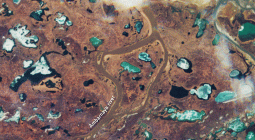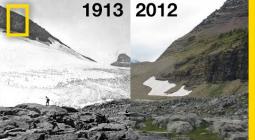Wildlife photographer of the year 2020, highly commended – in pictures.
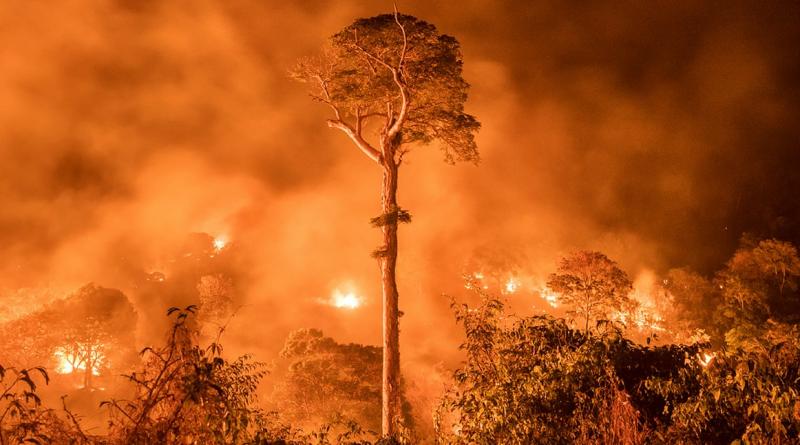
Winners will be announced on 13 October at a virtual awards ceremony. The exhibition at the Natural History Museum will open on 16 October
Behaviour, mammals category: Surprise! by Makoto Ando, Japan
A red squirrel bounds away from its surprise discovery – a pair of Ural owls. In a forest near his village on the Japanese island of Hokkaido, Makoto spent three hours hiding behind a nearby tree, watching the owl couple. Suddenly, a squirrel appeared from the treetops
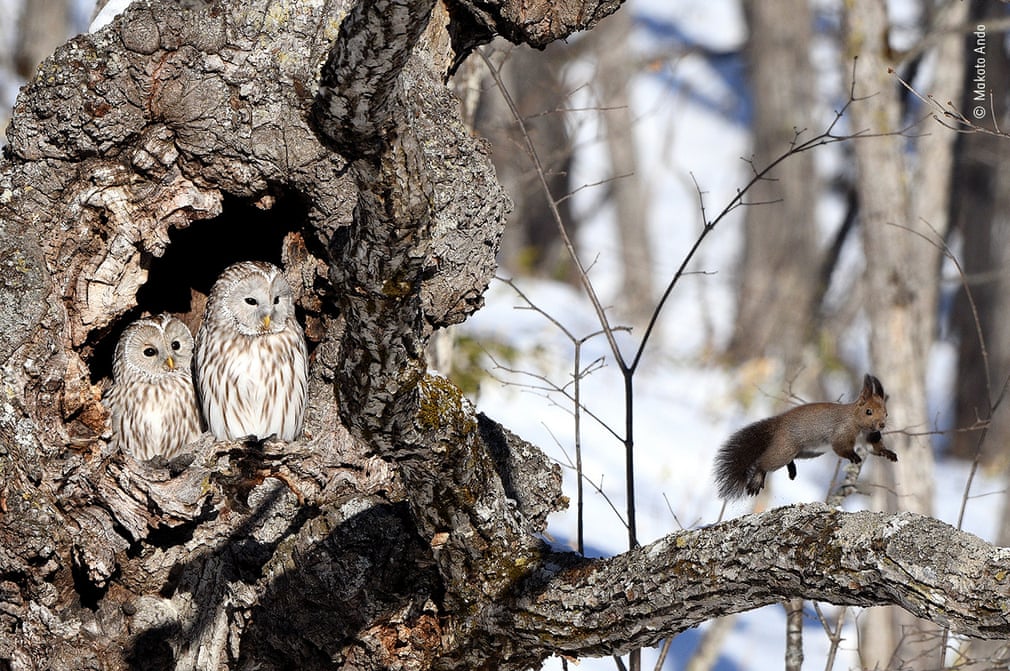
Urban wildlife category: Peeking possums by Gary Meredith, Australia
Two common brushtail possums – a mother (left) and her joey – peek out of their hiding place under the roof of a shower block in a holiday park in Yallingup, western Australia. Gary had watched them all week. They would pop up at sunset, keep an eye on the campers until dark, then squeeze through the gap and head for the trees to feed on the leaves of a peppermint tree.
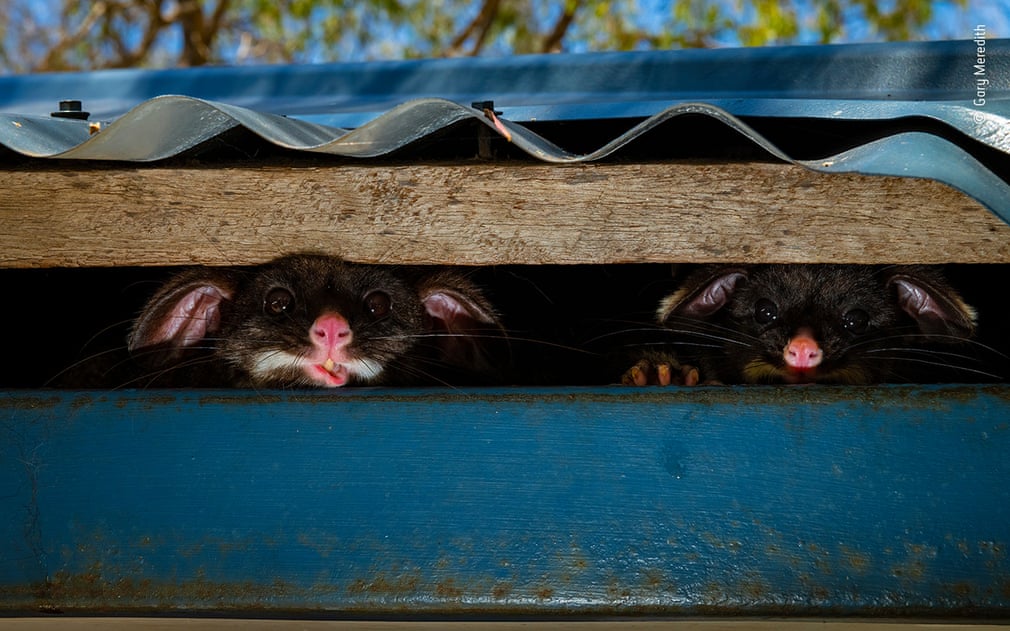
Animal portraits category: Eye of the drought by JoséFragozo, Portugal
An eye blinks open in the mud pool as a hippopotamus emerges to take a breath. The challenge for José was to catch the moment an eye opened. For several years, José has been watching hippos in Kenya’s Maasai Mara national reserve – here in a remnant of the drought-stricken Mara River
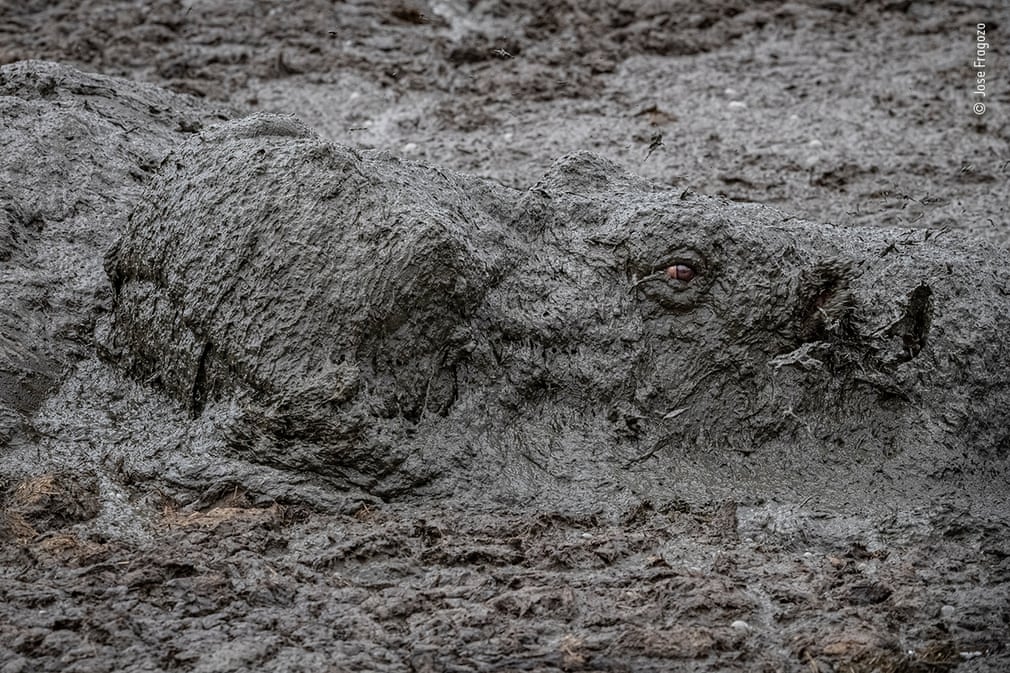
Mammals behaviour category: The rat game by Matthew Maran, UK
A young fox holds tight to her trophy – a dead brown rat – as her brother attempts to take it off her. For the past four years, Matthew has been photographing the foxes that live on a north London allotment. On this August evening, as Matthew watched the youngsters play, one of them ran out of the bushes with a dead rat in its mouth. The other three began squabbling over it and a tug-of-war ensued.
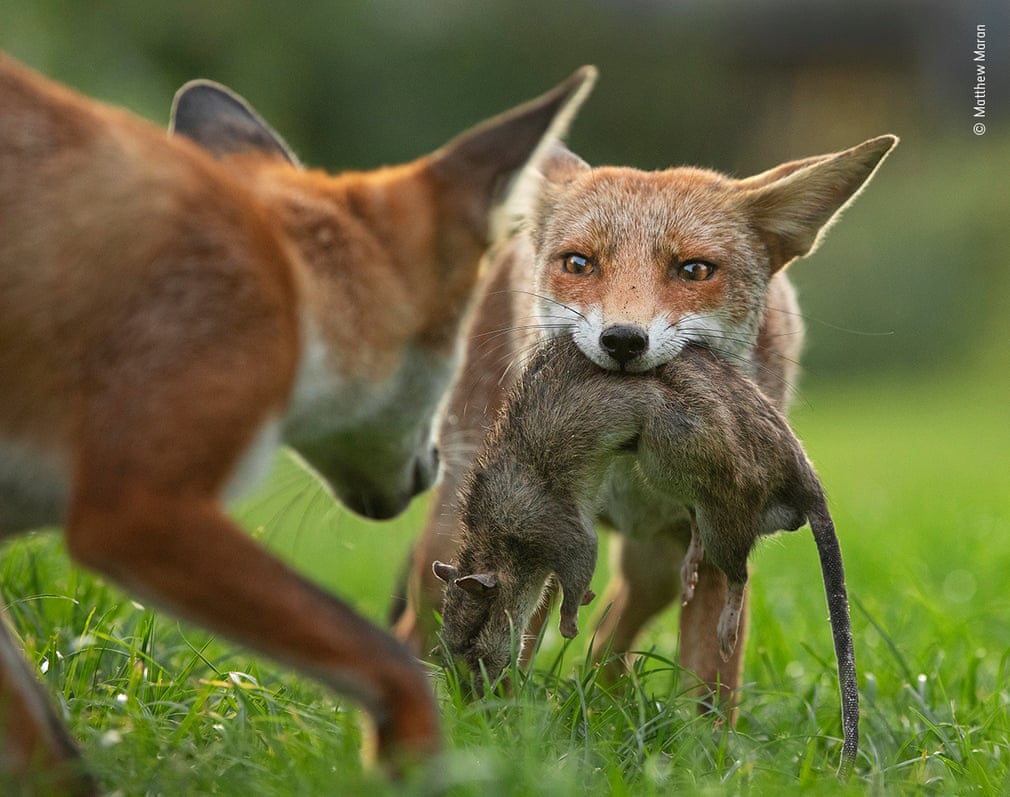
Invertebrates behaviour category: The spider’s supper by Jaime Culebras, Spain
A large wandering spider – black, hooked fangs, tipping its bristly, striped mouthparts – pierces the egg of a giant glass frog, injects digestive juices and sucks in its liquefied prey. Jaime had walked for hours, in darkness and heavy rain, to reach the stream in Manduriacu reserve, north-west Ecuador, where he hoped to find glass frogs mating. His reward was a chance to photograph a wandering spider with an 8cm leg span devouring the frogs’ eggs.
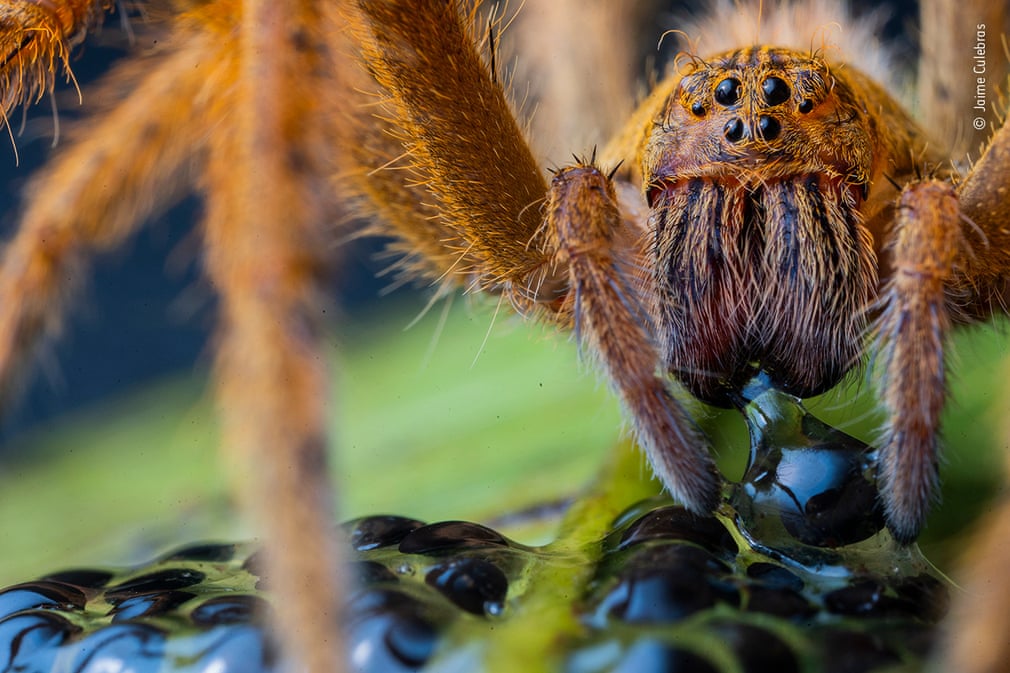
Wildlife photojournalism, single image category: Memorial to the albatrosses by Thomas P Peschak, Germany/South Africa
Unlikely as it seems, this display illustrates a South African conservation success story. It represents the comparatively smaller number of deaths of seabirds – here shy albatrosses and a yellow-nosed albatross and white‑chinned petrels – caught in 2017 on longlines set by Japanese tuna-fishing boats off South Africa’s coast.
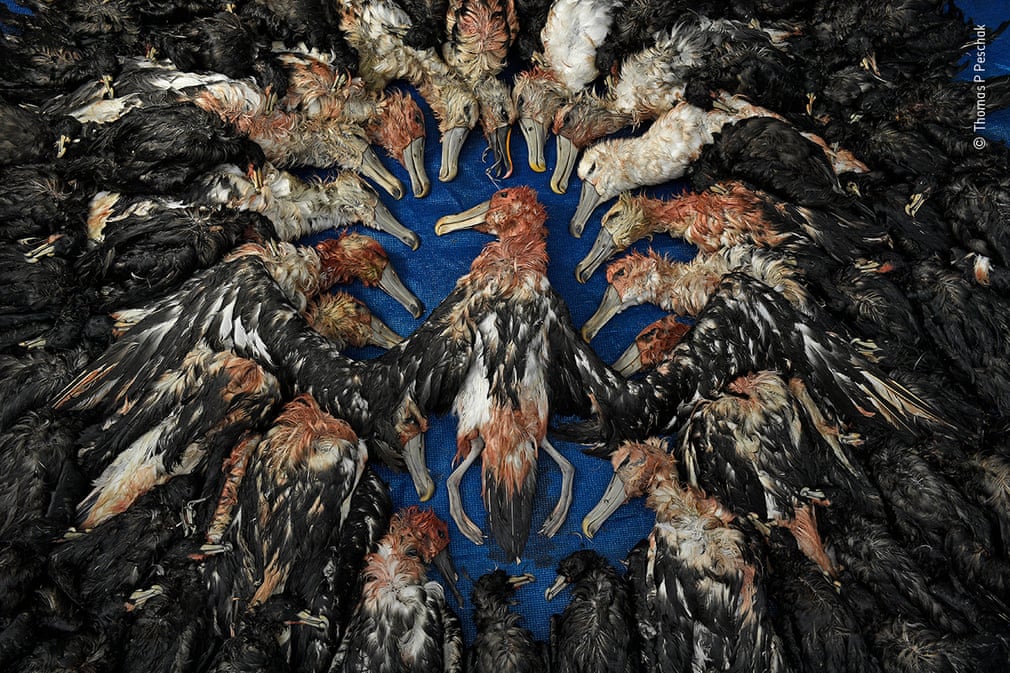
Wildlife photojournalism, single image category: A risky business by Quentin Martinez, France
A market trader slices up fruit bats surrounded by pythons to his right, with bamboo-skewered ‘bush’ rats beneath them, in Tomohon market in north Sulawesi, Indonesia. Quentin observed the reality of the bushmeat trade, where wild animals are tied to ropes or piled up in cages, awaiting butchery.
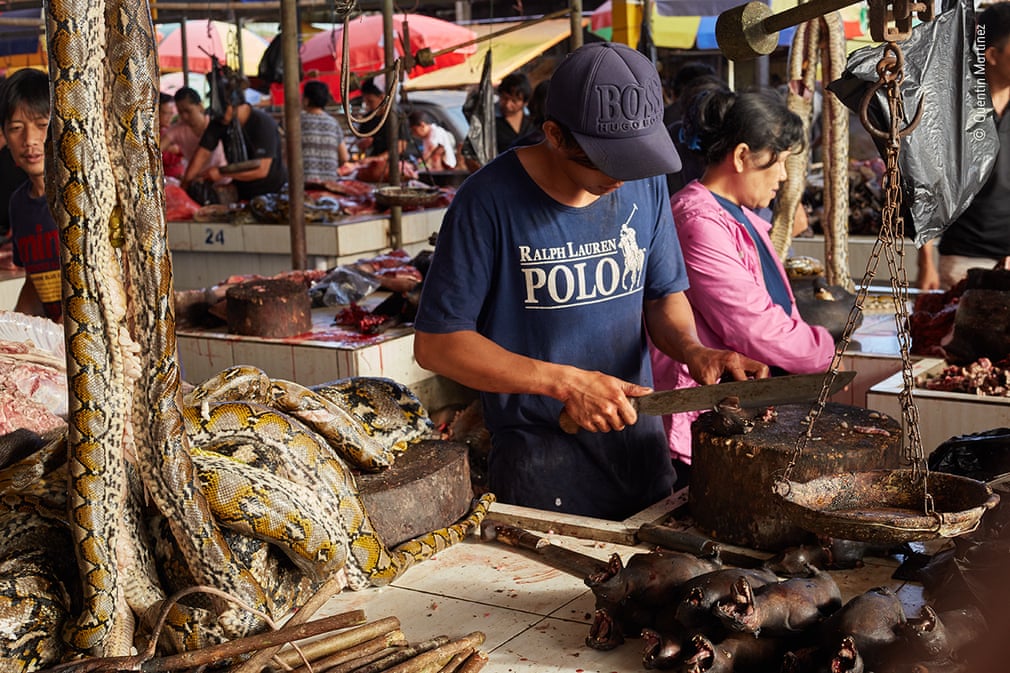
Wildlife photojournalism, single image category: World of tar by Garth Lenz, Canada
As twilight falls on the Alberta tar sands, the landscape takes on an oily blue tint. This vast expanse – once boreal forest – is just one section of the Mildred Lake tar mine, one of the region’s many tar mines that form the world’s third largest oil reserve.
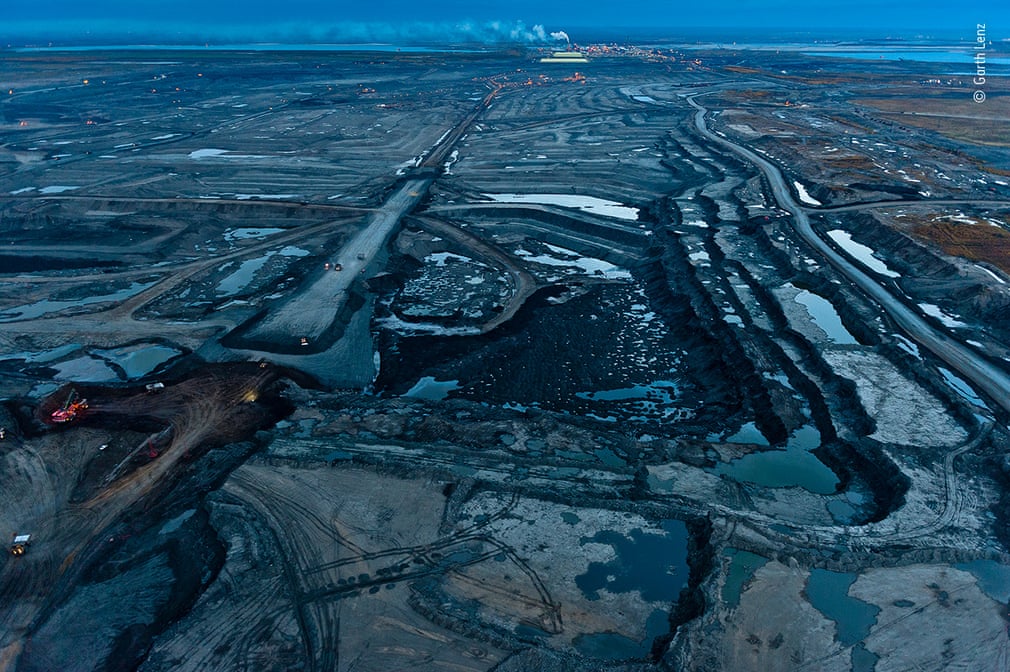
Underwater category: The night shift by Laurent Ballesta, France
As darkness falls on the remote coral Fakarava Atoll in French Polynesia, the molluscs begin to move. These large topshells – reaching 15cm across the base – spend the day hiding in crevices among corals, usually on the outer fringes of the reef.
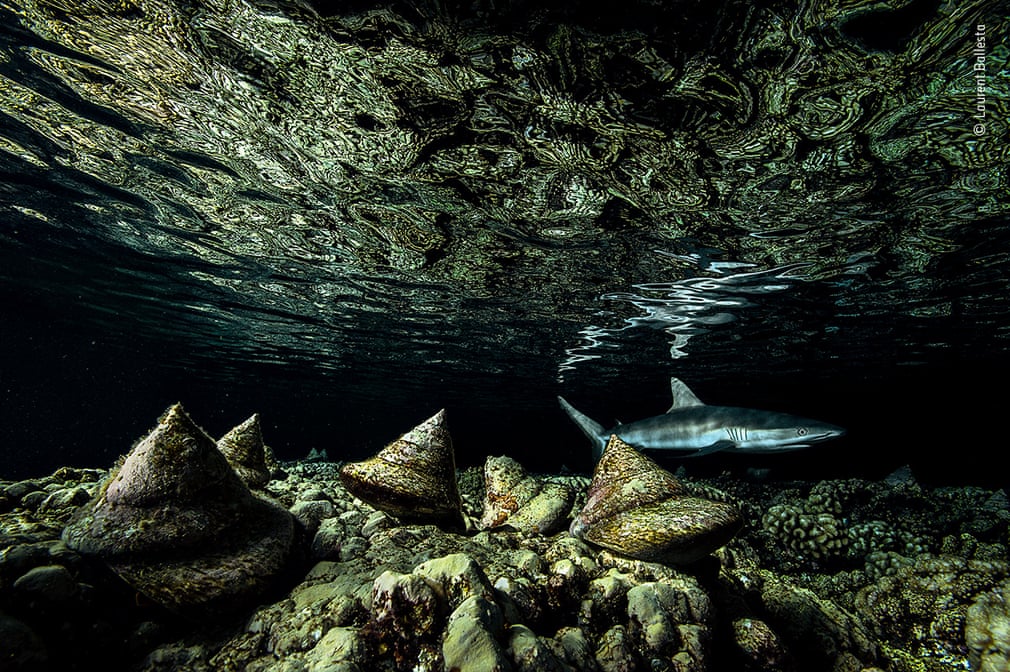
Amphibians behaviour: Head start by Dhritiman Mukherjee, India
A large male gharial provides support for his numerous offspring. It is breeding season in the National Chambal Sanctuary in Uttar Pradesh, northern India, and this usually shy reptile exudes confidence. The species is critically endangered – an estimated 650 adults are left, about 500 of them living in the sanctuary.
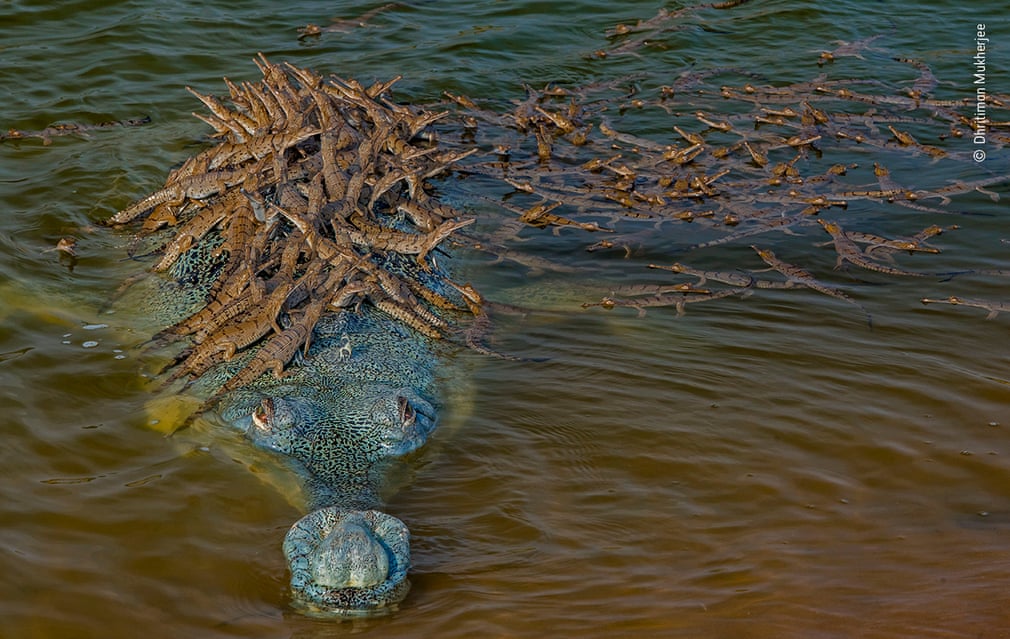
Plants and fungi category: The forest born of fire by Andrea Pozzi, Italy
The Araucanía region of Chile is named after its Araucaria trees – here standing tall against a backdrop of late-autumn southern beech forest. Andrea hiked for hours to a ridge overlooking the forest and waited for the right light, just after sunset, to emphasise the colours. The trunks gleamed like pins scattered on the landscape.
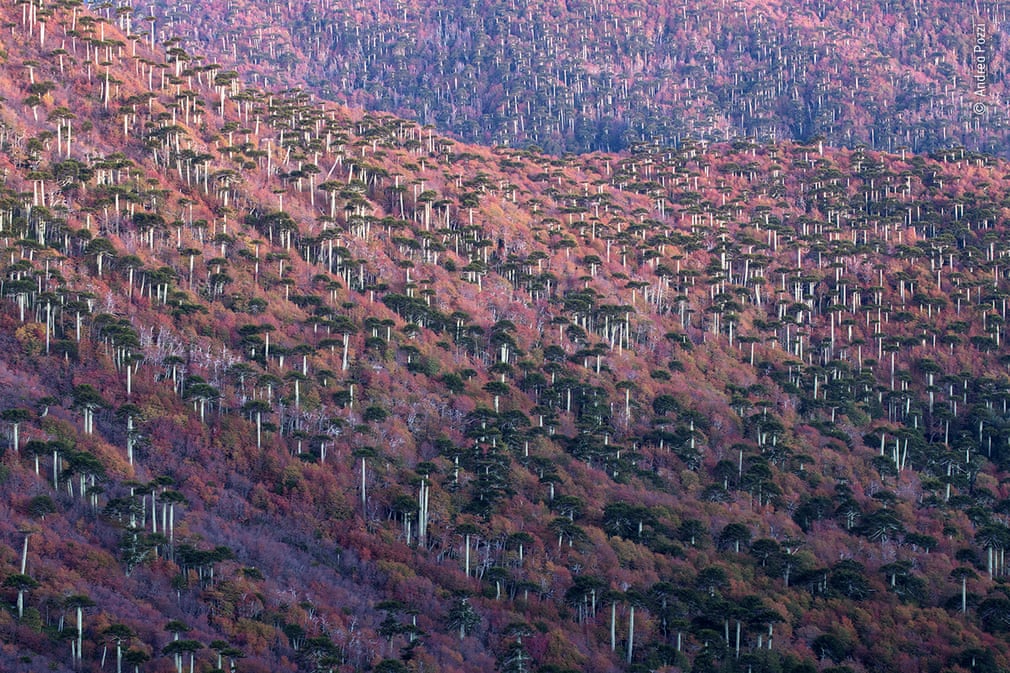
Birds behaviour category: Wind birds by Alessandra Meniconzi, Switzerland
High on the Alpstein massif of the Swiss Alps, Alessandra could barely stand, but the yellow-billed choughs, blasted by the wind, were in their element. As a scavenging flock drew close, Alessandra could hear them shrieking ‘so loud and insistent in the dramatic landscape’. Taking advantage of the gusts of wind sweeping the birds towards her, she captured their impressive acrobatics against the moody sky and jagged, snow-capped mountains.
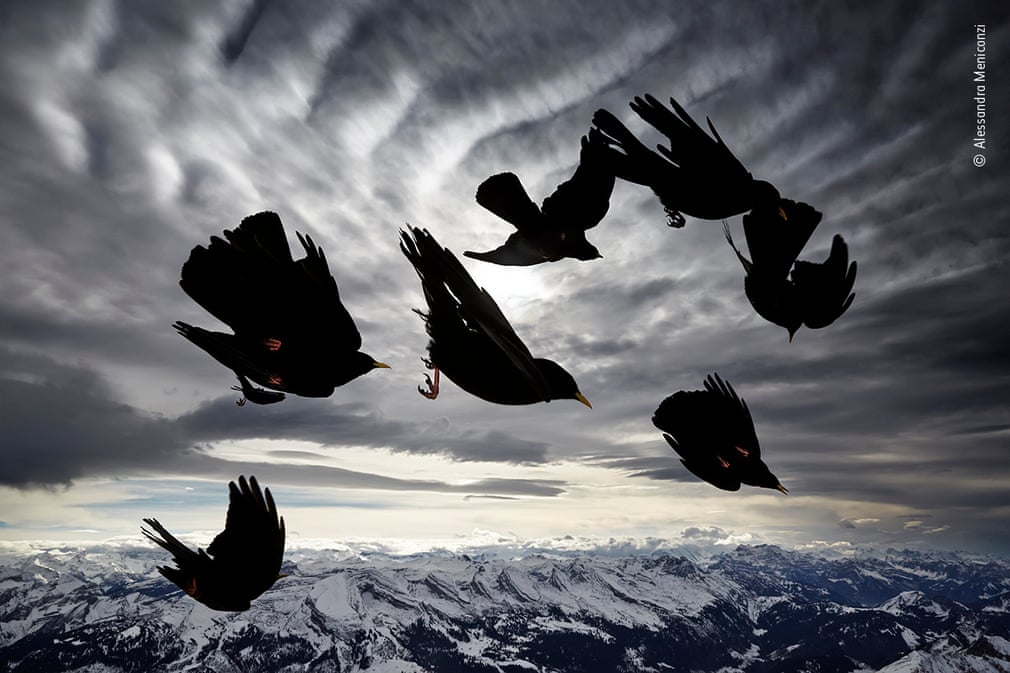
15-17 years old category: The perfect catch by Hannah Vijayan, Canada
A brown bear pulls a sockeye salmon from the shallows of a river in Alaska’s Katmai national park. The huge park contains Pacific coastline, mountains, lakes, rivers and an estimated 2,200 brown bears. In spring, when bears emerge from hibernation in their mountain dens, many head down to feed on sedges in open meadows and forage for clams on the mudflats.
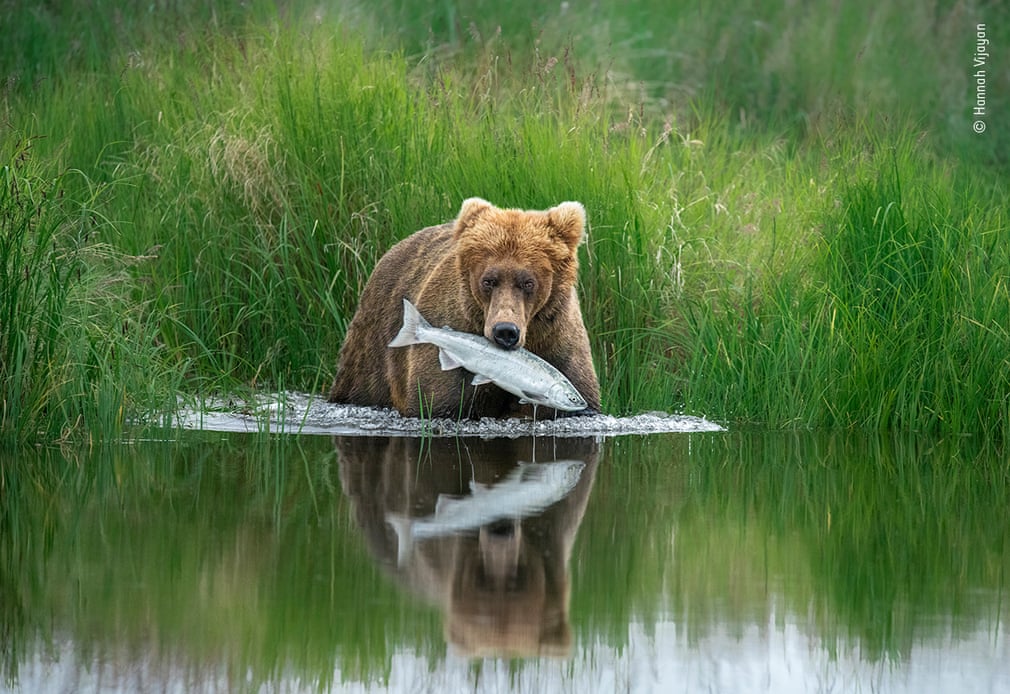
11-14 years old category: Treetop douc by Arshdeep Singh, India
When his father planned a business trip to Vietnam, Arshdeep read about the endangered red-shanked douc langur and asked his father to take him along. The meeting was near Son Tra nature reserve, Vietnam’s last coastal rainforest and a stronghold for the langur. Found only in Vietnam, Laos and Cambodia, the primate is threatened by habitat loss, hunting and trade.
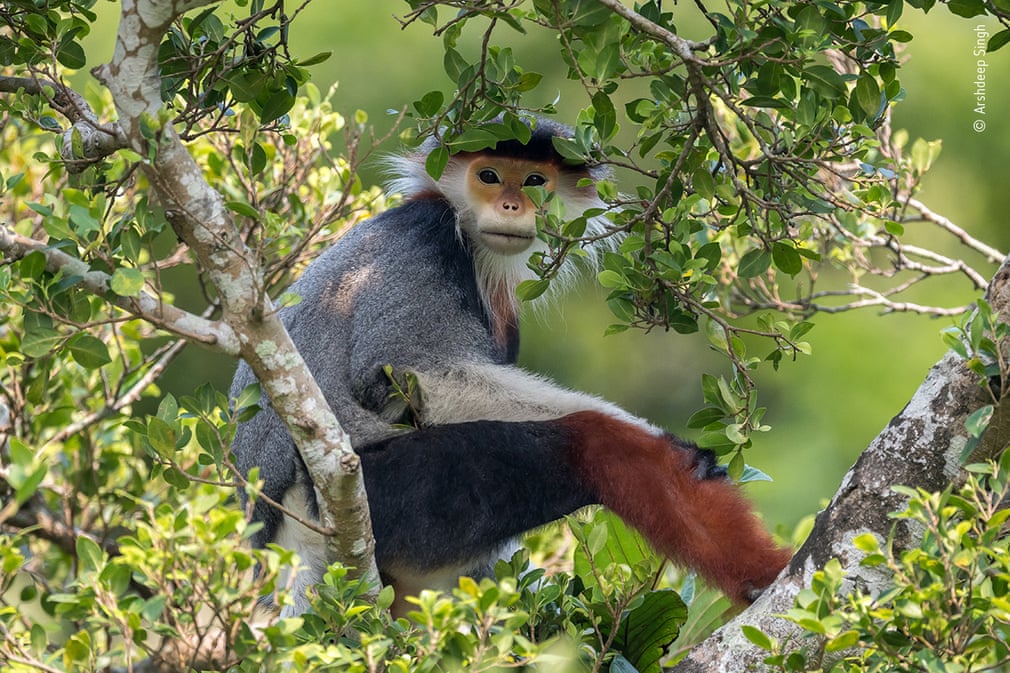
11-14 years old category: Paired-up puffins by Evie Easterbook, UK
A pair of Atlantic puffins in vibrant breeding plumage pause near their nest burrow on the Farne Islands. Every spring, these small islands off the coast of Northumberland attract more than 100,000 breeding pairs of seabirds. When wintering at sea, their plumage is a dull black and grey, but by the time they return to breed they sport black ‘eye liner’ and brightly coloured bill plates.
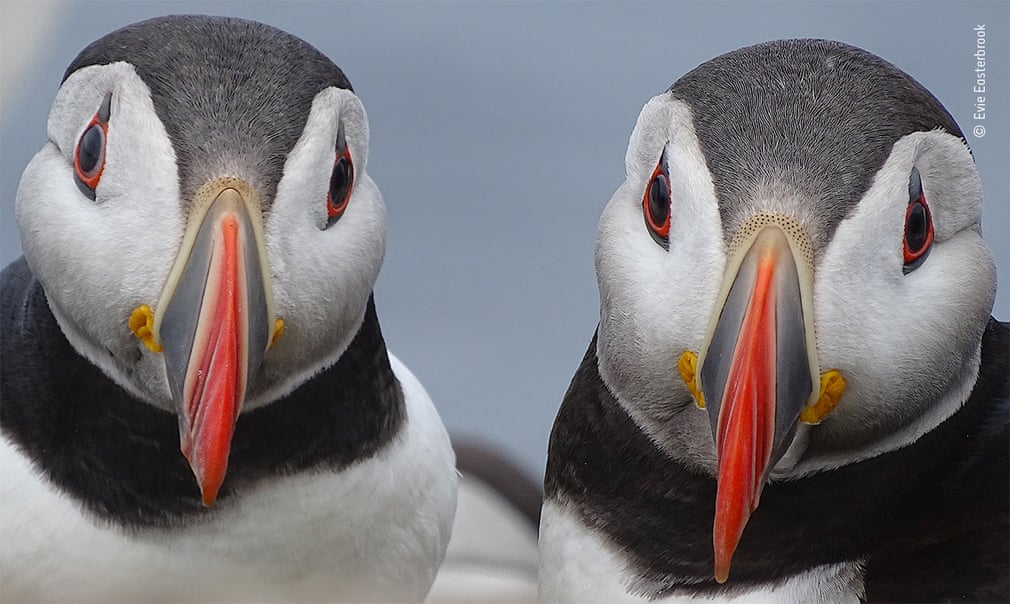
*Title photo:Wildlife photojournalism, single image category: Amazon burning by Charlie Hamilton James, UK
A fire burns out of control in Maranhão state, north-eastern Brazil. A single tree remains standing – ‘a monument to human stupidity’, says Charlie, who has been covering deforestation in the Amazon for the past decade.
2 September 2020
The Guardian


